





|
Best
viewed in Internet Explorer 5+ at a screen resolution of 1024 by 768
Pixels
Web-Site designed & maintained by WEB
SOLUTIONS
|
...Yoga...
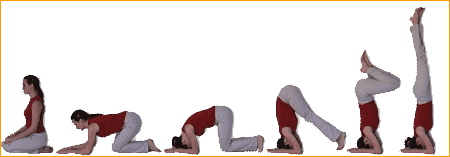
Why do one needs to do Yoga?
There's a short answer and a long answer to that question. The short answer is that yoga makes you feel better. Practicing the postures, breathing exercises and meditation makes you healthier in body, mind and spirit. Yoga lets you tune in, chill out, shape up -- all at the same time.
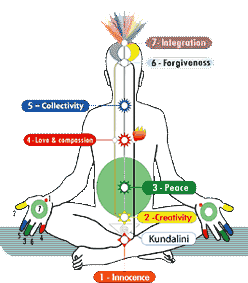 For
many people, that's enough of an answer. But there's more if you're interested.
For
many people, that's enough of an answer. But there's more if you're interested.
For starters, yoga is good for what ails you. Specifically, research shows that yogahelps manage or control anxiety, arthritis, asthma, back pain, blood pressure, carpal tunnel syndrome, chronic fatigue, depression, diabetes, epilepsy, headaches, heart disease, multiple sclerosis, stress and other conditions and diseases. What's more, yoga:
* Improves muscle tone, flexibility, strength and stamina
* Reduces stress and tension
* Boosts self esteem
* Improves concentration and creativity
* Lowers fat
* Improves circulation
* Stimulates the immune system
* Creates sense of well being and calm.
And that's just the surface stuff. In fact, most of the benefits mentioned above are secondary to yoga's original purpose.
Developed
in India, yoga is a spiritual practice that has been evolving for the last
5,000 years or so. The original yogis were reacting, in part, to India's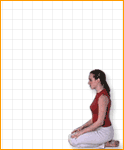
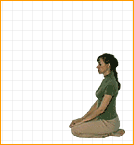 ancient
Vedic religion, which emphasized rituals. The yogis wanted a direct spiritual
experience -- one on one -- not symbolic ritual. So they developed yoga. Yoga
means "union" in Sanskrit, the classical language of India. According
to the yogis, true happiness, liberation and enlightenment comes from union
with the divine consciousness known as Brahman, or with Atman, the transcendent
Self. The various yoga practices are a methodology for reaching that goal.
In hatha yoga, for example, postures and breathing exercises help purify the
mind, body and spirit so the yogi can attain union. Pranayama breathing
exercises help clear the nadis, or channels, that carry prana the universal
life force, allowing prana to flow freely. When the channels are clear and
the last block at the base of the spine has been opened, Kundalini rises through
the spine, through the central channel called the sushumna-nadi, and joins
the crown chakra. According to the tradition, the release of Kundalini leads
to enlightenment and union.
ancient
Vedic religion, which emphasized rituals. The yogis wanted a direct spiritual
experience -- one on one -- not symbolic ritual. So they developed yoga. Yoga
means "union" in Sanskrit, the classical language of India. According
to the yogis, true happiness, liberation and enlightenment comes from union
with the divine consciousness known as Brahman, or with Atman, the transcendent
Self. The various yoga practices are a methodology for reaching that goal.
In hatha yoga, for example, postures and breathing exercises help purify the
mind, body and spirit so the yogi can attain union. Pranayama breathing
exercises help clear the nadis, or channels, that carry prana the universal
life force, allowing prana to flow freely. When the channels are clear and
the last block at the base of the spine has been opened, Kundalini rises through
the spine, through the central channel called the sushumna-nadi, and joins
the crown chakra. According to the tradition, the release of Kundalini leads
to enlightenment and union.
If
you do yoga will you become enlightened?
Well…you might (of course, it could take a few lifetimes of diligent
practice). But then again you might not. But it doesn't really matter because
yoga is a process, and there's a lot of good to be had along the way.
What
if you don't believe in talk about enlightenment, spirit and the rest of it?
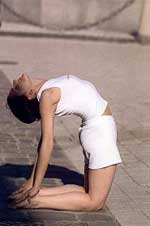 |
That's
okay, too. Yoga doesn't discriminate. Even if you don't believe in the
spiritual side of life,you can still do yoga. Whether enlightenment,
nadis, prana and Kundalini is literal truth, metaphor or myth is irrelevant.
If you doyoga, chances are that you will feel its psycho-physiological
effects. Moreover, the concept of union has a powerful down-to-Earth
meaning. Yoga helps us get in touch with our true selves. Between work,
home and all of the demands and stresses in between, it's easy to lose
touch with who we are, that core essence with which we were born. Rushing
around all day it sometimes feels like the "I" inside is simply
the result of the things we do all day -- or the effects those things
have on our minds, bodies and spirits. The
techniques developed by the yogis to transcend also help us strip away
the things that try to mis-define us -- the emotions, sensations, desires,
achievements and failures of daily life. Through yoga we learn to develop
a greater awareness of our physical and psychological states. As a result,
we're in a position to better manage our reactions to the thoughts,
feelings and responses we have to the various situations we deal with
every day.
|
 |
Yoga gives us control of ourselves. It helps cut through the layers of mis-identities that arise in response to our actions, experiences and feelings. It calms the frenzy, clears the clutter and allows us to get back in touch with ourselves. However, yoga is not about self-absorption. Yoga is about being in the world. Although most books, videos and websites focus on yoga postures, breathing and meditation, the tradition also emphasizes love, compassion, knowledge and right action as paths toward union. Whether you pursue yoga as a spiritual path or for its psycho-physiological benefits, yoga is a methodology for developing a deeper experience of your self and the world. And it makes you feel really good.